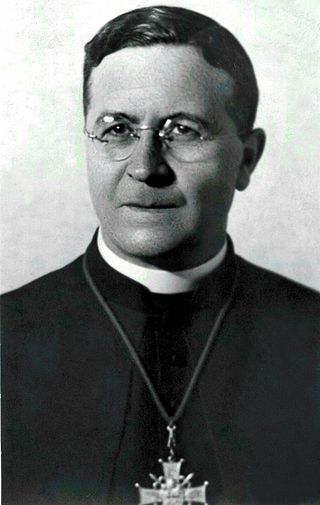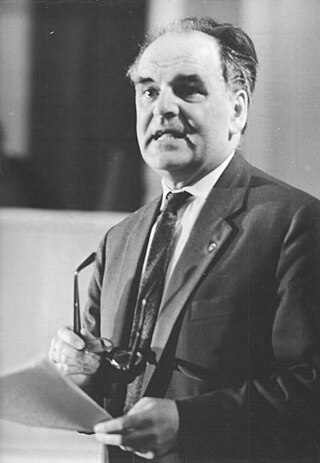Honours
-
 Romanian Royal Family: 56th Knight of the Royal Decoration of the Cross of the Romanian Royal House [3]
Romanian Royal Family: 56th Knight of the Royal Decoration of the Cross of the Romanian Royal House [3]
Anneli Ute Gabanyi (born 18 October 1942) is a German political scientist, literary critic, journalist, and philologist of Romanian background, especially known for her research on the society and culture of the Cold War period in Romania and the Romanian Revolution of 1989. A former main analyst for Südost-Institut in Munich, she is an associate researcher for the German Institute for International and Security Issues (Stiftung Wissenschaft und Politik) in Berlin. [1]
Born in Bucharest to a Transylvanian Saxon family of partly Hungarian heritage, she completed secondary studies in her parents' native town of Sibiu. [2] As a former trader, her father was subjected to restrictions by Communist authorities, and the Gabanyi family residence in the Sub Arini area was confiscated by the state. [2]
Gabanyi studied Philology and Political Science at the University of Cluj, and later at the Université d'Auvergne and the University of Southern California. [1] She received a PhD in Philology from the Helmut Schmidt University in Hamburg. [1]
In 1963, Gabanyi and her family were allowed, as ethnic Germans, to reunite with their relatives living in West Germany (all of whom had retreated with the Wehrmacht from Northern Transylvania at the end of World War II). [2] According to Anneli Ute Gabanyi, this was made possible by the efforts of her father, who had profited from détente in German-Romanian relations. [2] They settled in Munich, where she became an analyst for Radio Free Europe (1969); she was head of the station's Romanian Research Section until 1987. [1]
She has frequently visited her native country after the Revolution, and is a regular contributor to Sfera Politicii .

The German Institute for International and Security Affairs is a German think tank in international relations and security studies. A semi-official organization with close links to the federal government, it advises the Bundestag and the federal government on foreign and security policy issues, and also advises decision-makers in international organisations relevant to Germany, above all the European Union, NATO and the United Nations. SWP is regarded as one of Europe's most influential think tanks in international relations. It is headquartered in Berlin and incorporated as a foundation.
Jochen Bleicken was a German professor of ancient history.
Werner Abelshauser is a German economic historian.

Dionisie Alexandru Ghermani was a professor, writer, philanthropist, and political activist.
Michael Epkenhans is a German military historian known for his works dealing with the German Imperial Navy. He was the director of the Otto-von-Bismarck-Stiftung in Friedrichsruh from 1996 to 2009. In February 2009 he became the director of research for the Militärgeschichtliches Forschungsamt der Bundeswehr in Potsdam. Following a reorganisation in 2013, the organisation became the Center for Military History and Social Sciences of the Bundeswehr.

Joseph Schubert was a Romanian cleric and a titular bishop of the Roman Catholic Church.

Ernst Engelberg was a German university professor and Marxist historian.
George Guțu is a Romanian philologist, teacher in the Department of German Language and Literature of the Faculty of Foreign Languages and Literatures, University of Bucharest. He is also director of the Paul Celan Center for Research and Excellence and the Master programme "Intercultural Literary and Linguistic Communication Strategies", initiated by the Department of Germanic Languages and Literatures together with other departments of the Faculty of Foreign Languages and Literatures. His academic activity is based on the history of German literature ; German and Austrian contemporary literature; German literature from Romania, cultural inter-referentiality in Central and Southeast Europe, particularly in Bukovina, poetics, literary theory, translation, the history of German studies and guidance for PhD students. His research domains are the history of German literature; comparative literature; German literature from Romania; cultural inter-referentiality; imagology; the history and aesthetics of reception; theory and practice of translation.

Christian Hartmann is a German historian. He is a research fellow at the Institute of Contemporary History in Munich.

Ursula Männle is a German Social sciences academic and politician (CSU). She served between 1983 and 1994 as a member of the Bundestag. More recently, between 2000 and 2013, she was a member of the Bavarian Landtag, chairing an important parliamentary committee and, till 2009, chairing the women's working group in the Landtag.

Ulrich Pfeil is a German historian based in France.
Erich Angermann was a German historian for North American history at the University of Cologne.
Hans-Christof Kraus is a German historian.

Dieter Pohl is a German historian and author who specialises in the Eastern European history and the history of mass violence in the 20th century.

Annette Weber is a German political scientist specialised in Northeast Africa and gender studies. She has been serving as European Union Special Representative (EUSR) for the Horn of Africa since 1 July 2021. Weber previously worked as a journalist, a human rights defender and most recently as the regional expert at the German Institute for International and Security Affairs. She is also a novelist.

Cambodia–Germany relations are diplomatic relations between Cambodia and Germany. Diplomatic relations between the Federal Republic of Germany and Cambodia were established on October 3, 1993. The GDR had already maintained diplomatic relations with Cambodia since 1962.
Hadumod Bußmann is a German linguist.
Eva Cyba is an Austrian sociologist. Her research, teaching and publications focus on sociological theories of social inequality, feminist theories and women's studies, in particular women in the world of work. She is the winner of the Käthe-Leichter-Staatspreis. Her book Gender and Social Inequality is considered a fundamental work of sociological gender research.
Christina Klausmann was a German historian, publicist and curator specializing in gender relations and women's movement culture in Germany.